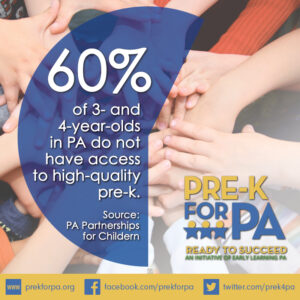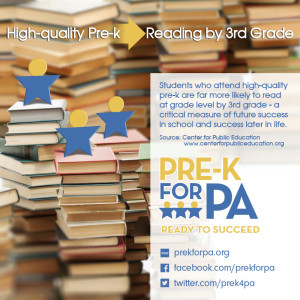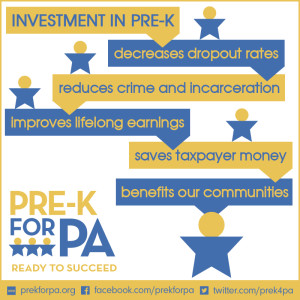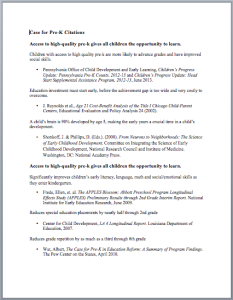THE CASE FOR PRE-K
Access to high-quality pre-k gives all children the opportunity to learn.
 EVERY CHILD BENEFITS: When all children arrive ready to learn, they are best able to take advantage of the educational benefits of classroom learning.
EVERY CHILD BENEFITS: When all children arrive ready to learn, they are best able to take advantage of the educational benefits of classroom learning.
- Children who are enrolled in a high-quality pre-k program are more likely to advance grades and have improved social skills.
- When children begin with high-quality pre-k, this early investment prevents the achievement gap from becoming too wide and reduces the need for costly interventions in the future.
- A child’s brain is 90% developed by age 5, making the early years a crucial time in a child’s development.
Pre-k strengthens our schools.
 RESEARCH IS STRONG: A growing body of research demonstrates that high-quality pre–k strengthens a child’s overall performance in grades K through 12.
RESEARCH IS STRONG: A growing body of research demonstrates that high-quality pre–k strengthens a child’s overall performance in grades K through 12.
- High-quality pre-k significantly improves children’s early literacy, language, math and social/emotional skills as they enter kindergarten.
- High-quality pre-k reduces special education placements by nearly half through 2nd grade.
- High-quality pre-k reduces grade repetition by as much as a third through 8th grade.
- High-quality pre-k increases the likelihood of high school graduation and college enrollment, which in turn leads to stronger employment opportunities and increased lifetime earning potential.
Pre-k lays the foundation for a more successful Pennsylvania.
 PRE-K HAS SHORT- AND LONG-TERM ECONOMIC BENEFITS:
PRE-K HAS SHORT- AND LONG-TERM ECONOMIC BENEFITS:
- It helps build intellectual infrastructure for the future, yielding both social and economic benefits.
- Investment in pre-k saves taxpayers’ money in the long term by reducing the need for special education and remedial instruction, and increasing the rates of graduation and college enrollment.
- Enrollment in high-quality pre-k decreases the likelihood of at-risk children committing a crime later in life, which reduces taxpayer costs associated with public safety, prosecution, and incarceration.






